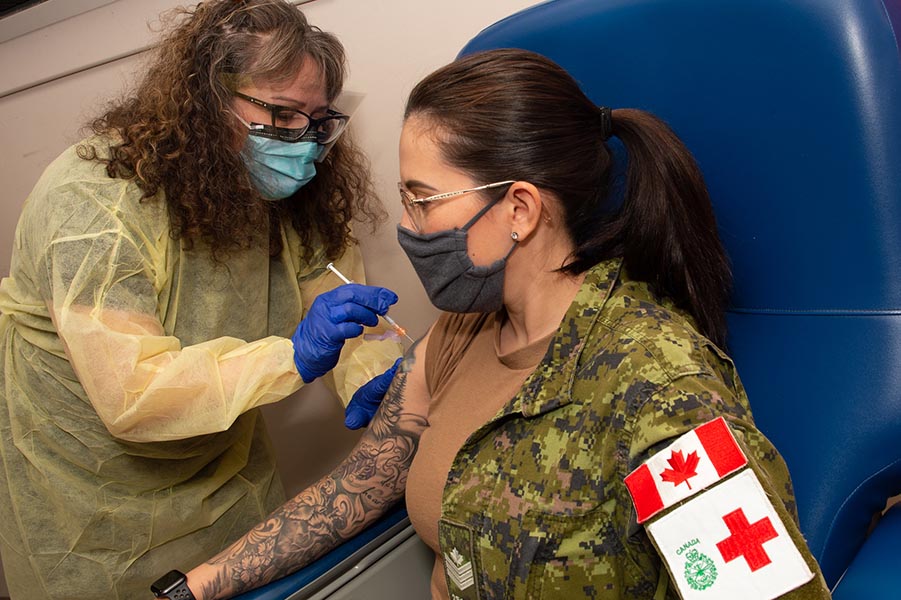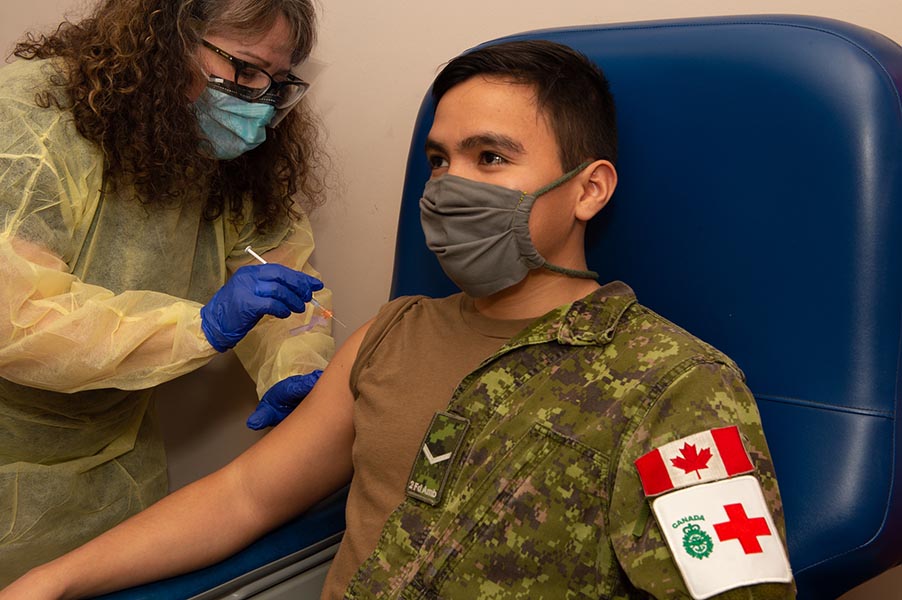Canadian Army Medical advisor says get informed, get vaccinated
Article / April 13, 2021 / Project number: 2021-04-13
Note: to view additional photos, click the photo under Image Gallery.
By Steven Fouchard, Army Public Affairs
Ottawa, Ontario — As the vaccination process for the Canadian Armed Forces (CAF) unfolds, Colonel David Coker has a simple message for his colleagues: he is feeling optimistic and so should you.
The Canadian Army (CA) Medical Advisor recently sat down for a lengthy interview in which he addressed some common misconceptions, explained why he feels hopeful, and why vaccination is both safe and effective.
“Get informed and get vaccinated, and continue to practice public health measures,” Col Coker said. “If you’ve got a question, it’s legit.”
The following interview has been edited for length and clarity.
You’ve expressed optimism about where we are with COVID-19. Why should CA members feel the same?
With the news cycle we have nowadays, and the misinformation out there, we lost a sense of how significant it is that we have COVID-19 vaccines at all. A year ago, there was talk of how many years it might take to develop them, let alone get them distributed worldwide. And then, lo and behold, we started getting news in December that there were some good vaccine candidates being developed and even approved in Canada, and that the effectiveness of these vaccines was way beyond expectations. One of the questions was how were the vaccines developed so quickly? How can they be safe? What corners were cut? That’s understandable, but context is very important. If you think of the vaccines as a house, the foundation is already laid and the walls were already framed since researchers have already been developing and studying these types of vaccines for years. The final step was customizing that house to make it COVID-proof. It’s exciting to see that we’re near the finish line. We just need to get there.
What should we know about the Moderna vaccine that has been allocated to the CAF?
It’s got a 94 per cent effective rate. To put that in context, 15,000 people in a study got both doses and 15,000 didn’t get any. Among the people that got the vaccine, there were 94 per cent fewer cases of symptomatic COVID in that group compared to the other. That’s incredible. People will ask, can I get COVID-19 from the vaccine? That’s a hard no. The Moderna vaccine doesn’t contain any live or deactivated virus. I think that’s important to understand.
What about side effects?
They’re similar to any other vaccine that you’ve probably already had over the course of your life. Basically, as your body is developing immunity after a vaccination, it comes with certain symptoms that some people experience to a greater degree than others. For example, over 90 per cent of people will get some kind of pain or some soreness at the injection site. To a lesser degree, some people will have a bit of fatigue, headaches, muscle pains, and chills. All of those will generally occur one to three days after the vaccination and last for the same amount of time. They’re generally mild. A very small number of people will experience those symptoms more severely. Those folks might need a day off. In terms of more severe side effects, we haven’t seen any so far in the CAF. In the larger population, serious side effects like bad allergic reactions are very rare – we’re talking about two or three for every million doses. There’s no reason to expect long-term issues 10 or 20 years down the road based on how long we’ve been working with this type of vaccine, and our experience to date. It’s a fair point to say we don’t have 20 years of data but if we wait 20 years before giving these vaccines there’s going to be a lot of suffering.
What are variants and what do we know about vaccine efficacy against them?
Every time the virus is transmitted from one person to another there’s an opportunity for mutation. The vast majority of mutations don’t change the characteristic of the virus or, if they do, it’s not in a significant way. There are three main variants of concern: the B117, which was first identified in the UK. It’s associated with higher transmissibility and a higher degree of illness severity. The next one is B1351, which was identified in South Africa and is associated with higher transmissibility. The other two, P1 and P2, were identified in Brazil. Does Moderna work against the variants? For the South Africa and UK variants, the answer is yes. For the Brazilian variant, we’re still waiting on research. So there is concern there, but thus far we’re pretty happy - Moderna seems to work quite well and we continue to monitor for any indications to the contrary.
What would you say to those who might still be hesitant?
Bluntly speaking, choosing not to get the vaccine means you won’t have a sore arm but that you’ll remain at increased risk of getting COVID-19 and all of the severe health consequences that go with it. Not to mention you’ll remain more likely to pass it on to others. I don’t want to be extreme or dramatic but COVID-19 has really disrupted CAF operations. For every case in a unit there’s an average of 12 people who have to quarantine. So every case - and we’ve had our share of cases - has a major impact. It’s not just about getting the vaccine for you as an individual. From the broader population view, once we get to a high enough proportion of people that are immunized, we’ll be able to examine how we can gradually reduce these quarantine requirements. Get informed and get vaccinated. If you’ve got a question, it’s legit. We don’t want people to go in reluctant. We’re not trying to trick anyone into getting it. The vaccine is safe and COVID-19 is dangerous.

